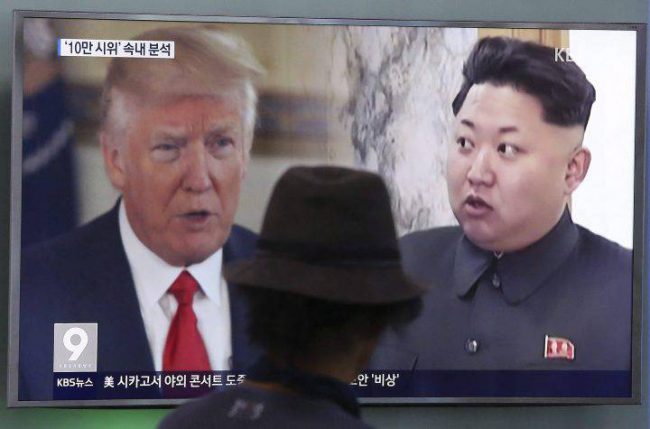With North Korea issuing warnings that “war may break out at any moment,” it’s no surprise that a recent survey by the Angus Reid Forum found more Canadians are fearful of a nuclear attack.

A survey of 1,534 Canadian adults conducted in September found 55 per cent believe the prospect of nuclear war is “very” or “fairly” serious. That’s a marked increase from the 36 per cent of Canadians who said the concerns were serious in November 2016 — a 19 percentage point increase in 10 months.
READ MORE: North Korea on edge and warns ‘war may break out at any moment’
The survey also notes that that women were more likely than men (64 per cent vs. 45 per cent) to believe that nuclear war is a serious concern.
The research forum notes the spike in Canadians’ concerns is a direct result of missile testing from North Korea and the words of anger exchanged between the country and U.S. President Donald Trump.
WATCH: Trump says ‘you’ll see pretty soon’ when asked about North Korean tweet

North Korean leader Kim Jong Un and Trump have threatened retaliation and warfare several times in the past few months. Several analyses have found that missiles fired by North Korea could have an impact on Canada.
READ MORE: North Korea’s missile could hit Canada, and we might not be protected, experts say

Get breaking National news
North Korea’s July test of a Hwasong-14 intercontinental ballistic missile (ICBM), with a range of anywhere from 6,700 to 8,000 kilometres, showed that the nation now may have a weapon that could threaten parts of Canada along the border with Alaska, experts told Global News last summer.
REALITY CHECK: Why a nuclear war likely won’t break out
The threats exchanged, and the tests conducted, are things Canadians are following fairly closely. About 31 per cent of respondents said they have seen “a lot of media coverage” about the issue, while 42 per cent said they had seen some. Only 26 per cent of Canadians had seen little or no coverage.
A majority of respondents, at 60 per cent, say the rising tensions between North Korea and the U.S. are at least somewhat Canada’s problem. But there’s still little consensus about what the Canadian government should do.
WATCH: North Korea accuses Trump of declaring war

Twenty-nine per cent said Canada should join the U.S. ballistic missile defence system, while 44 per cent said the country should “stay out” of the system. The remainder were unsure. Conservatives were more likely to be in favour joining the system, at 53 per cent. Liberals (23 per cent) and New Democrats (20 per cent) were notably less in favour of the move.
Canadians were also on the fence about whether joining the defence program would ultimately make the country safe — 42 per cent said no, 40 per cent said yes, 19 per cent were unsure.
The government is currently mulling whether it should join the U.S. in ballistic missile defence (BMD).
READ MORE: Trudeau government hasn’t ruled out joining U.S. on ballistic missile defence
“When we look at what BMD (defence) is, what the threats are, we need to actually spend more time on making sure that we do get this right,” Minister of National Defence Harjit Sajjan said outside the House of Commons earlier this month.
Sajjan’s comments were the first confirmation that the Liberals have not ruled out asking the U.S. to participate in its continental missile shield, which Canada opted not to join after a national debate in 2005.
- Real Canadian Superstore fined for ‘misleading’ Product of Canada displays
- Provinces are bracing for record deficits. What’s causing budgets to see red?
- Democrats probe Trump donor’s ‘influence’ over Gordie Howe bridge threat
- ‘No reason to continue discussing’: Ontario mayor wants Andrew’s name dropped
What Canadians in the survey did seem relatively certain about is that the issue of nuclear warfare won’t go away soon. Nearly eight-in-10 agreed: “This issue of North Korean weapons testing will never go away.”
READ MORE: North Korea has Hawaii preparing for a nuclear attack
How serious could the issue get, realistically?
Earlier this month, Prime Minister Justin Trudeau called the tensions between North Korea and the U.S. “very scary for everyone,” but said de-escalation efforts are well underway.
Vice-president of the NATO Association of Canada, Tina Park, told Global News in August that a nuclear war is “highly unlikely.”
Any real military action would require much more than “rhetoric,” and both sides would have to weigh their intelligence options and the political and economic ramifications, she said.
WATCH: Trudeau calls North Korea situation ‘very scary for everyone’

Parks said that Canada’s role amid the tensions should be to provide humanitarian relief to North Korea’s impoverished population.
“Canada is not a military power, with humanitarianism, we are uniquely suited.”
— With previous Global News files, the Canadian Press








Comments
Want to discuss? Please read our Commenting Policy first.